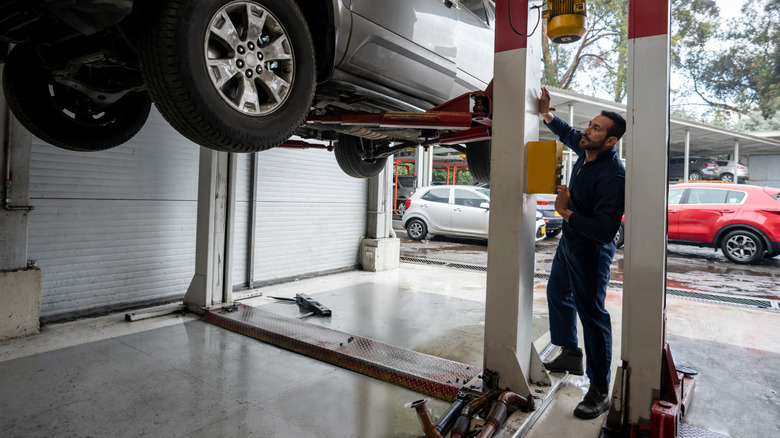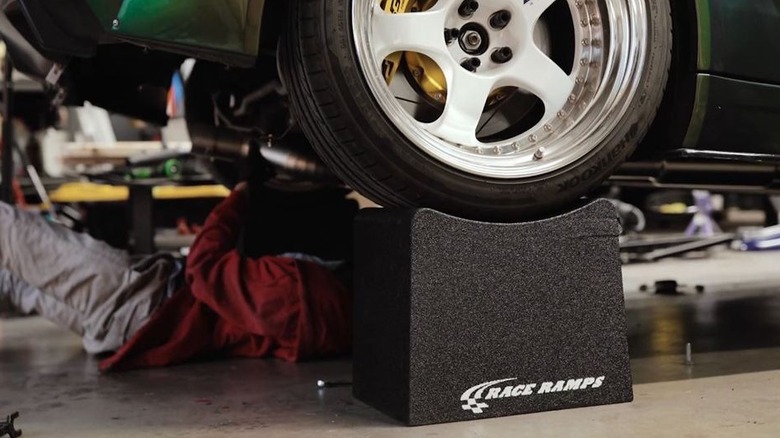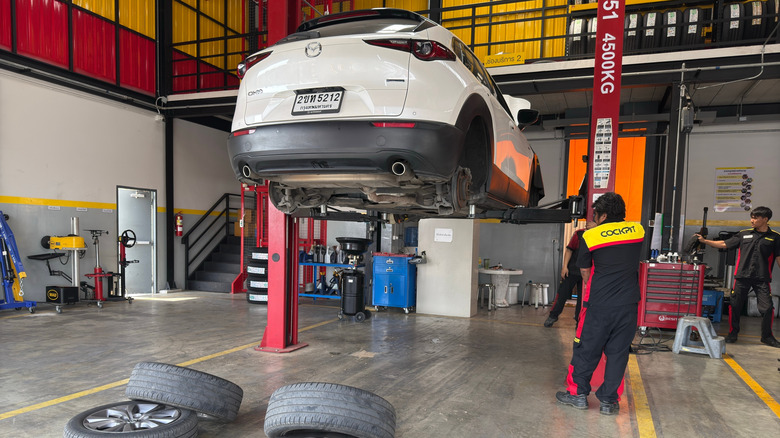This May Be The Best Car Lift Alternative For Your Home Garage
I've worked on my own cars for decades, with lots of projects that require getting a vehicle off the ground. I've done countless oil changes, exhaust swaps, brake jobs, tire rotations, and even replaced a suspension components while my car was on jacks and jack stands. And whenever these DIY auto jobs require that I put a car up on jack stands, I always wish I had a lift instead. They're easier to use, they feel much more secure, and I feel safer under the car while working on it. Plus, I don't have to lay on my back to get the work done.
On the rare occasion I could use a garage lift (often by cajoling or otherwise bribing a friend) I've felt like automotive royalty. Jacking up a car only takes a few minutes, but it somehow feels significantly less laborious to just put something on a lift and be able to work on it in mere seconds. And with a lowered car (which I own), getting underneath just to jack up the car can be even more difficult — requiring specialized low-profile jacks that are often more expensive than the standard fare.
Lifts are expensive though (some of the cheapest lifts from popular companies like BendPack are around $4,000) and I can't really install one in the parking space assigned to the apartment I rent. So, my solution is ramps. They're much cheaper than lifts and much easier than jacks, especially for small jobs like oil changes.
How ramps can help if you don't have a lift
There are several specific tasks that ramps can help with when it comes to working on your car. I use Race Ramps with a low degree of approach for my car (they also double as loading aids whenever I'm putting my car on a trailer for transport) but those might not be right for everyone. My car is light, and low to the ground, but if your car is heavy you may want something more substantial — be sure to check out our guide on which ramps will be best for you. Relatively low ramps are typically best for quick work under the car — like the oil changes mentioned earlier. Taller ramps can also be used for longer jobs like engine-out services if they're connected to (or used in conjunction with) items like wheel cribs.
Ramps can also be used to level a vehicle if you're camping off-road. I've often used my ramps to even out my camper van in off-road scenarios. That's another scenario where you need to be very aware of the weight limit of the ramps you choose, but if you have the right setup, it can make activities like camping in your truck much more comfortable. Ramps also have the distinct advantage of taking up no overhead space in your garage. To install a lift you'll often need high enough ceilings to accommodate the posts, and the car once it's lifted up above your head.
Benefits of using a lift instead
No matter how convenient an option like ramps are, there are certain things you can't do when your wheels are placed firmly on the ground (or on the ramps). Brake services, most suspension work, and of course anything having to do with the wheels or tires is out of the question with ramps. Ramps can only get your car so high as well.
Where you can stand, walk, and comfortably work underneath a car that's on a stable lift, ramps generally mean you'll be working from your back — even if the car is high enough to fit something like a rolling creeper underneath. That sort of setup is okay for an oil change or maybe even a bigger job like swapping out your exhaust, but it's a pain for bigger jobs. Having swapped out a few transmissions over time, some on jack stands and others on two-post lifts, I can say with complete confidence that's the kind of job I'd rather have a lift for.
A bit of an in-between option worth considering is a portable lift. Small portable lifts like the kind made by Quick Jack can be super handy when you don't want to install a permanently-mounted lift in your garage, but they aren't cheap. Depending on what model you need for your specific car, some versions cost more than $2,000.


